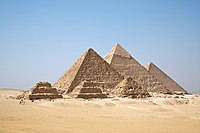African culture

African culture means all the things that make up the way of life of the people who live in Africa. It includes things like their language, music, dance, art, food, clothing, traditions, beliefs, and values.
In Africa, people have different languages and dialects depending on where they are from. Some of the popular languages are Swahili, Hausa, Yoruba, and Zulu.
African music is very lively and often involves drums, singing, dancing, and other musical instruments such as flutes and guitars. The music tells stories, expresses emotions, and brings people together.
Dance is an important part of African culture, and every tribe or ethnic group has its own traditional dance style and moves. The dances often have a story or message behind them, passed down from generation to generation.
Art in Africa is diverse and creative in nature. From intricate beadwork to pottery and sculpture, African art has a unique identity that is recognizable across the globe.
Food is a vital aspect of life in Africa. Each region has its own unique cuisine based on the ingredients and the culture of the people. Examples of traditional African food include cassava, plantain, millet, yams, groundnuts, and rice.
Clothing in Africa also varies depending on the region and climate. Many people in Africa wear brightly colored and patterned clothes that reflect their culture and heritage.
Traditions and beliefs form an integral part of African culture. There are many customs and practices that are unique to different ethnic groups, and these are passed down from one generation to the next. For example, in some African cultures, it is customary for a bride-to-be to receive a dowry from the groom before the wedding.
Finally, African culture values respect, hard work, community, and family. The people of Africa have a deep sense of identity and pride in their culture and heritage, which is expressed through music, art, dance, food, and traditions.
In Africa, people have different languages and dialects depending on where they are from. Some of the popular languages are Swahili, Hausa, Yoruba, and Zulu.
African music is very lively and often involves drums, singing, dancing, and other musical instruments such as flutes and guitars. The music tells stories, expresses emotions, and brings people together.
Dance is an important part of African culture, and every tribe or ethnic group has its own traditional dance style and moves. The dances often have a story or message behind them, passed down from generation to generation.
Art in Africa is diverse and creative in nature. From intricate beadwork to pottery and sculpture, African art has a unique identity that is recognizable across the globe.
Food is a vital aspect of life in Africa. Each region has its own unique cuisine based on the ingredients and the culture of the people. Examples of traditional African food include cassava, plantain, millet, yams, groundnuts, and rice.
Clothing in Africa also varies depending on the region and climate. Many people in Africa wear brightly colored and patterned clothes that reflect their culture and heritage.
Traditions and beliefs form an integral part of African culture. There are many customs and practices that are unique to different ethnic groups, and these are passed down from one generation to the next. For example, in some African cultures, it is customary for a bride-to-be to receive a dowry from the groom before the wedding.
Finally, African culture values respect, hard work, community, and family. The people of Africa have a deep sense of identity and pride in their culture and heritage, which is expressed through music, art, dance, food, and traditions.
Related topics others have asked about:
